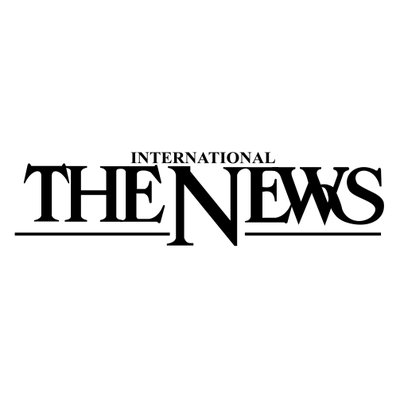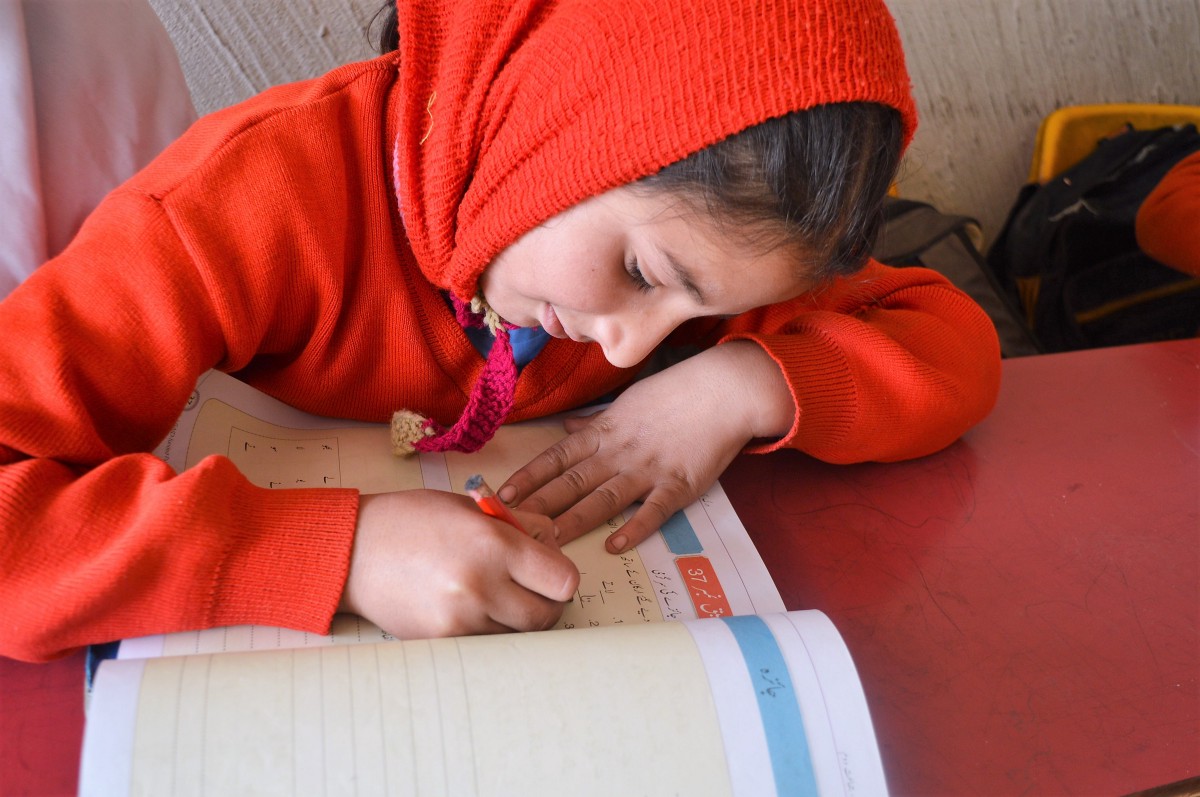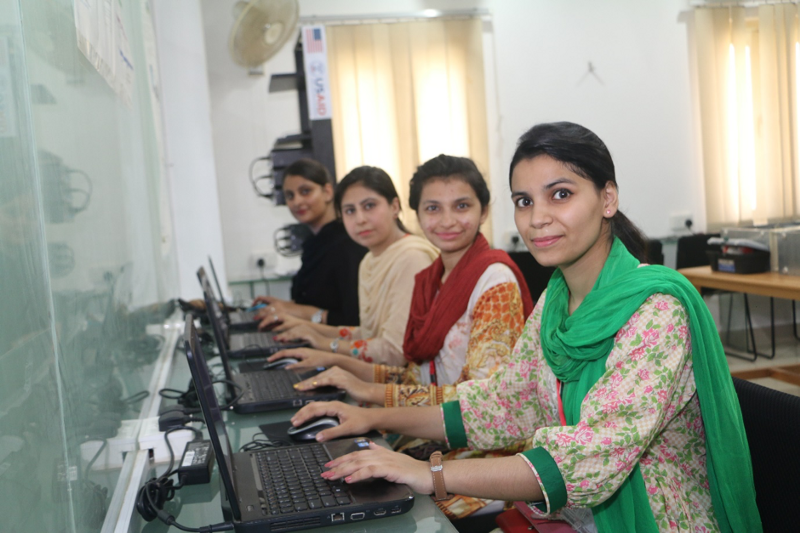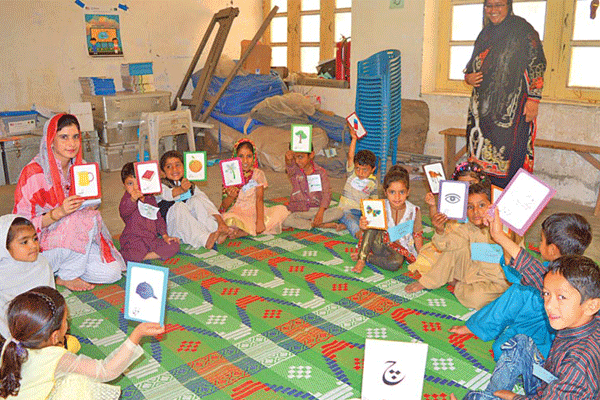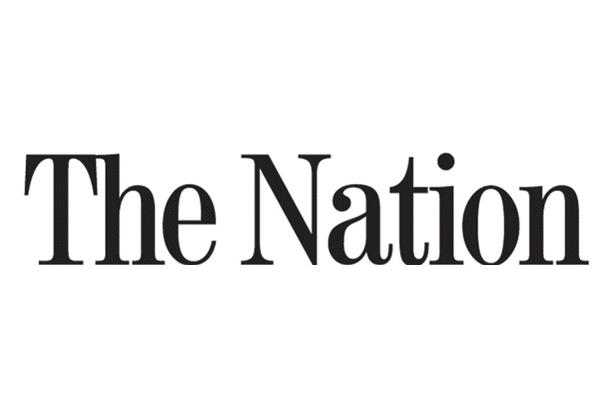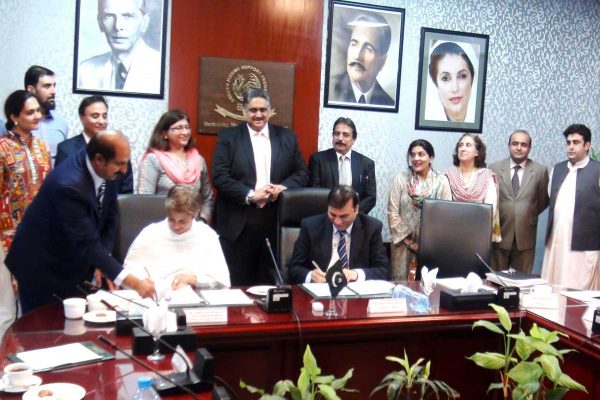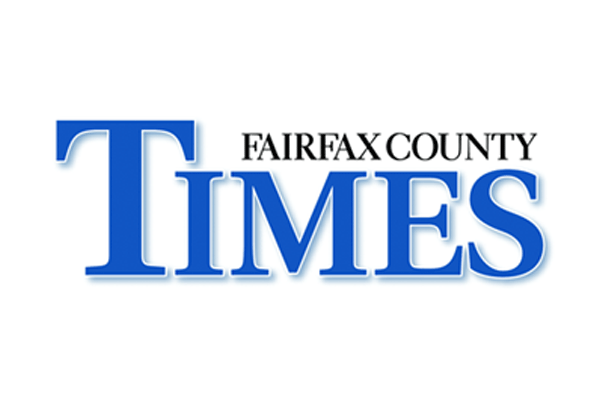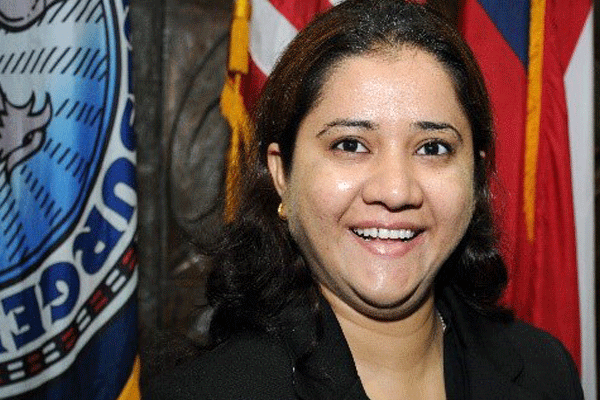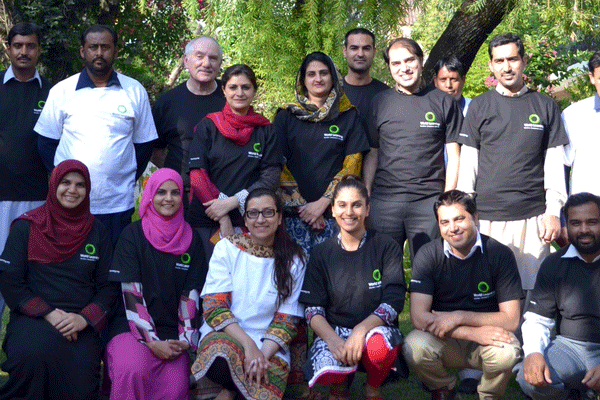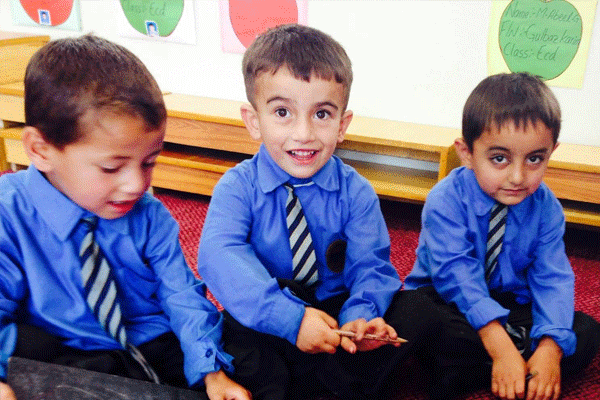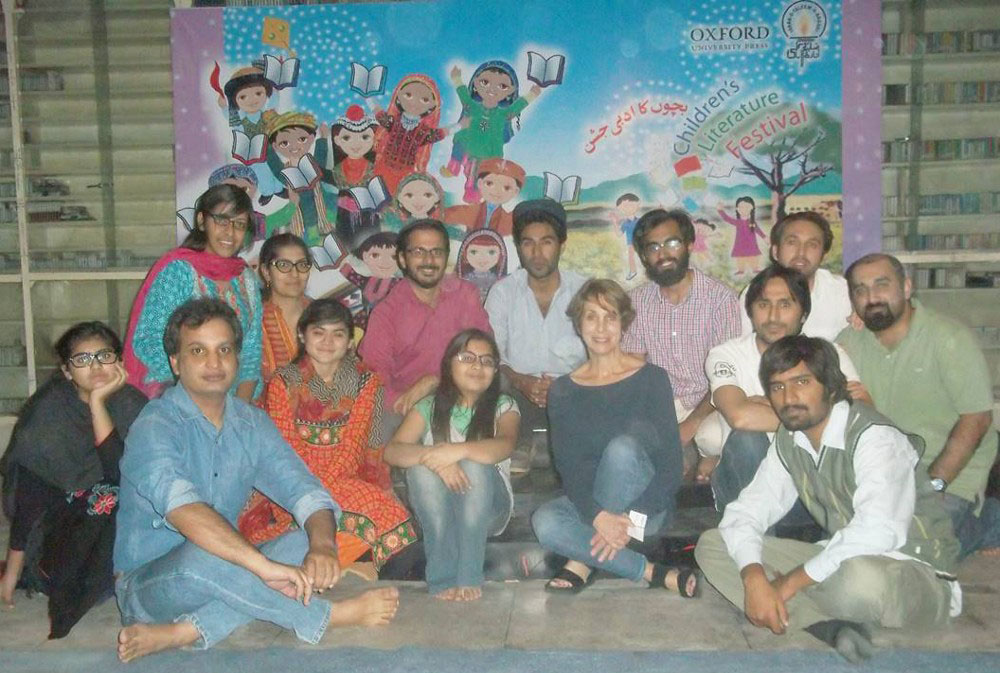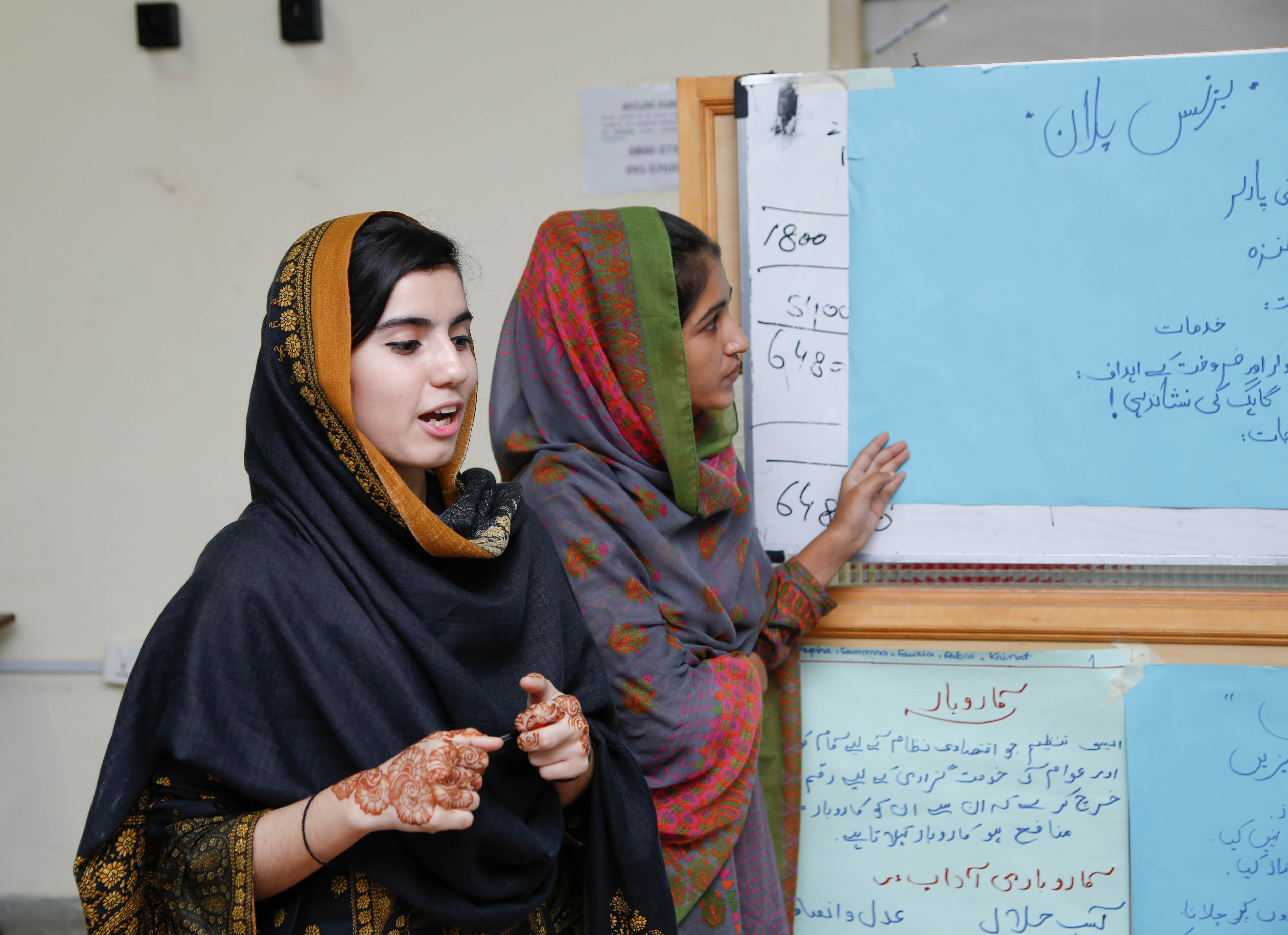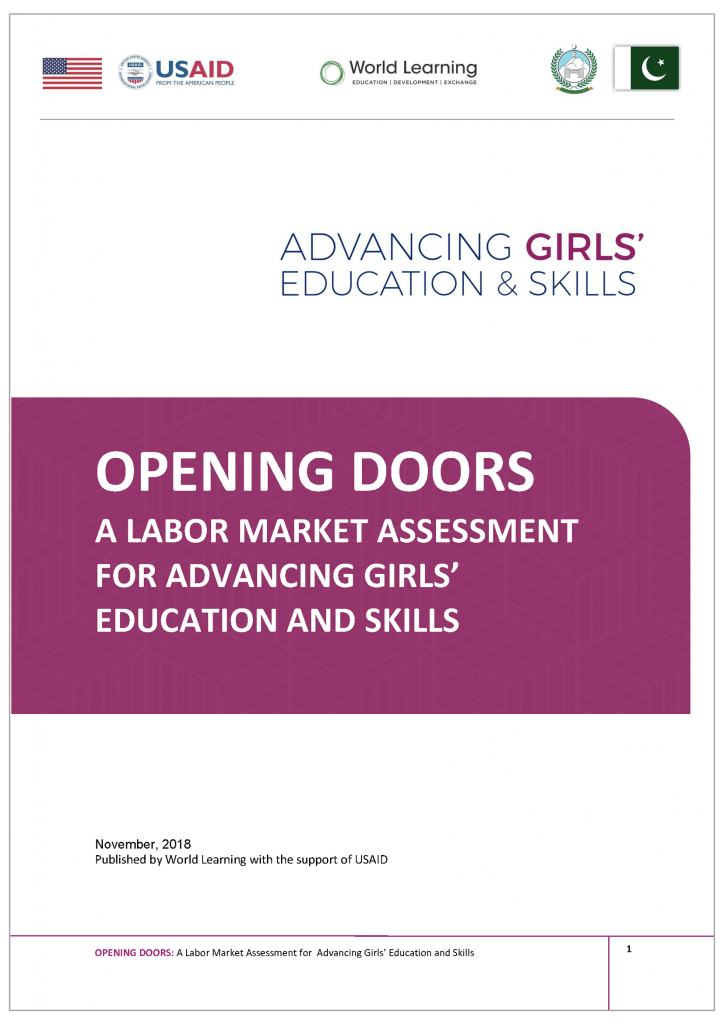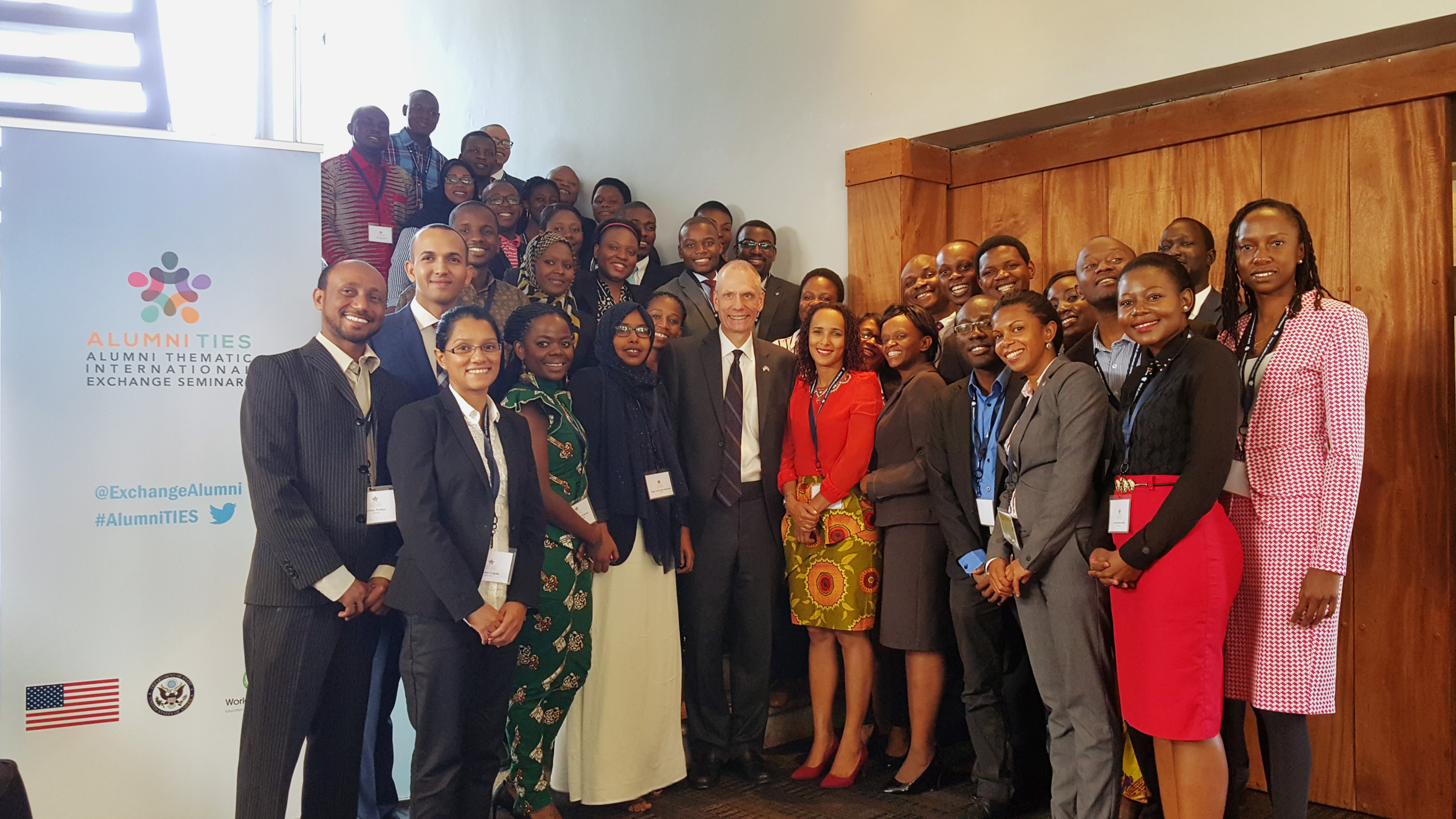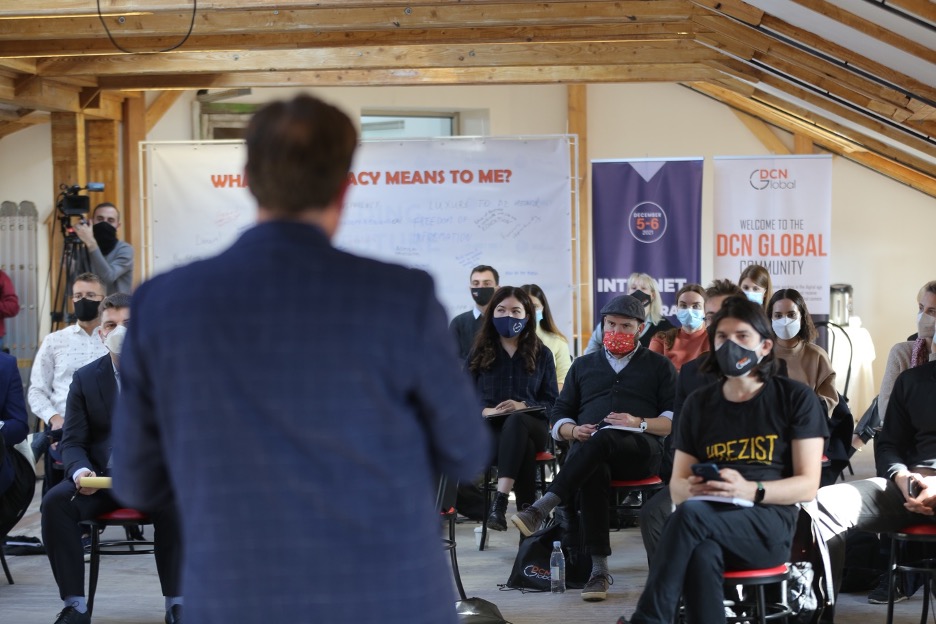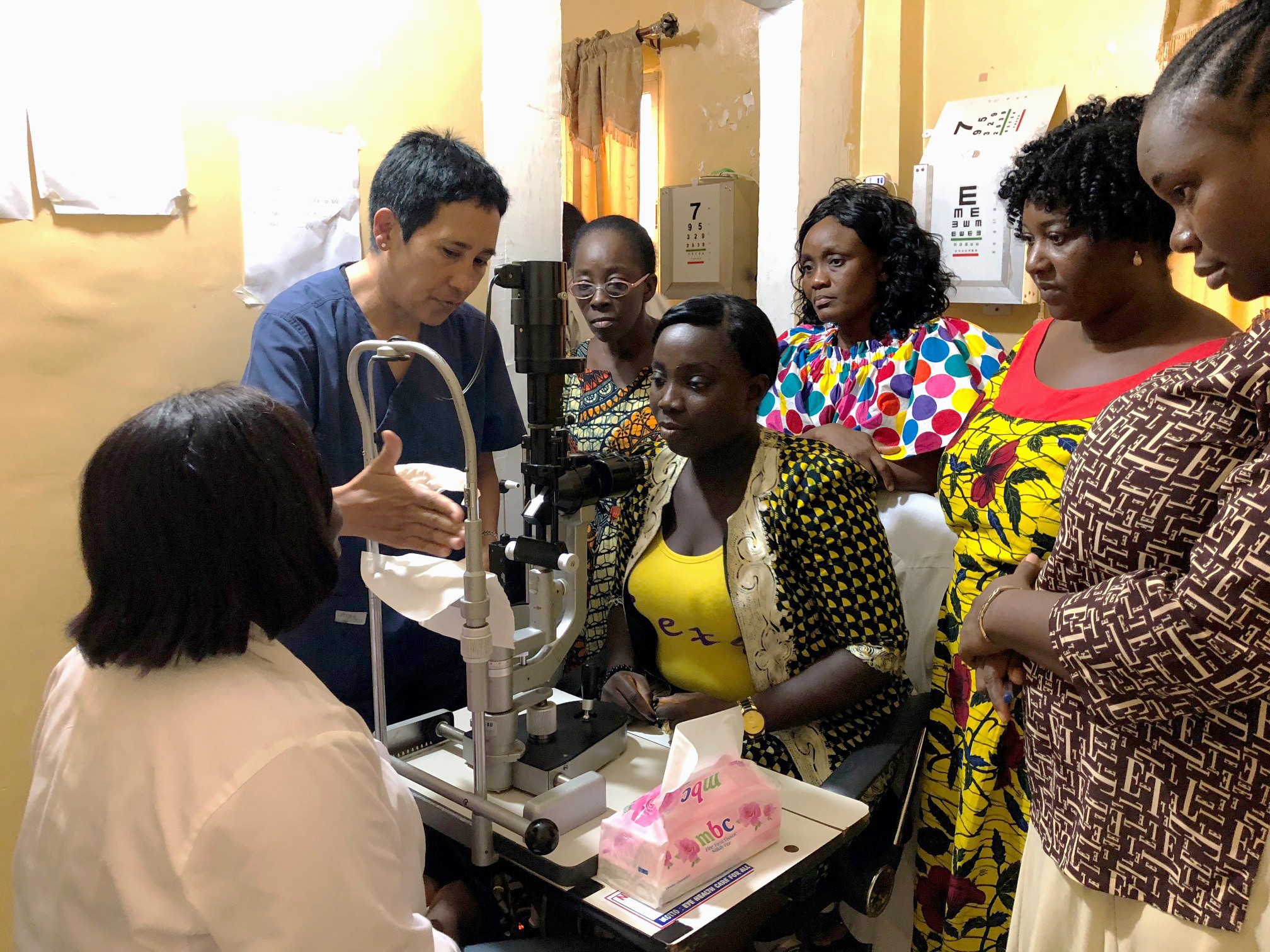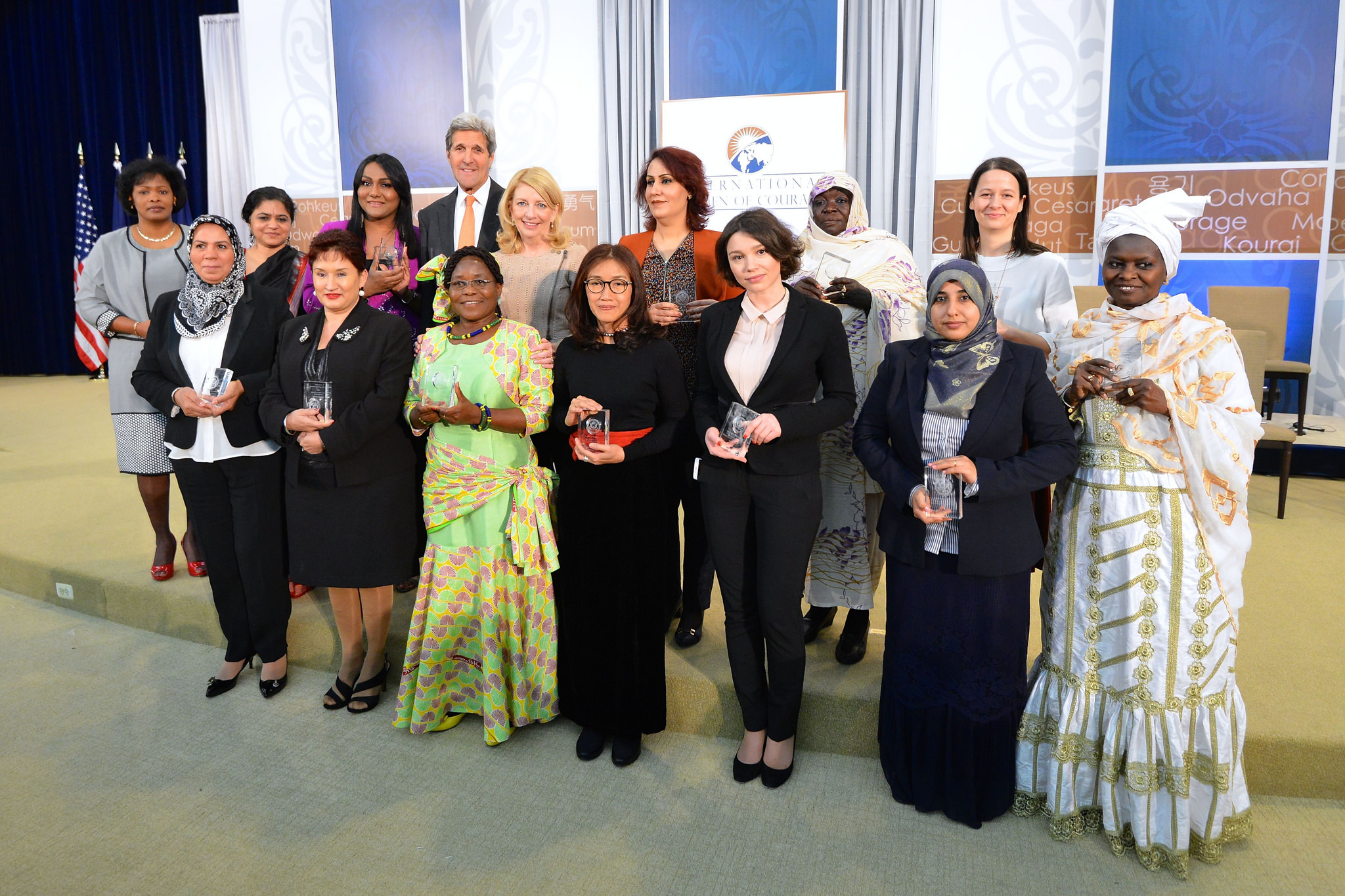-
What We Do
- WHERE WE WORK
-
About Us
 Welcome Message from Carol Jenkins
Welcome Message from Carol JenkinsFor more than 90 years, World Learning has equipped individuals and institutions to address the world’s most pressing problems. We believe that, working together with our partners, we can change this world for the better.
On my travels, I’ve had the opportunity to meet with many of those who have joined us in this mission. In Baghdad, we’ve trained more than 2,300 Iraqi youth who are already giving back at home. In London, our partners in the TAAP Initiative strongly believe that we are all responsible to practice inclusion. And in Vermont, our Experiment in International Living and School for International Training participants prove every day that they have the tools and the determination to change the world.
Please join us in our pursuit of a more peaceful and just world.
- Get Involved
Country: Pakistan
In Pakistan, World Learning is Improving Literacy and Creating New Opportunities for Teachers
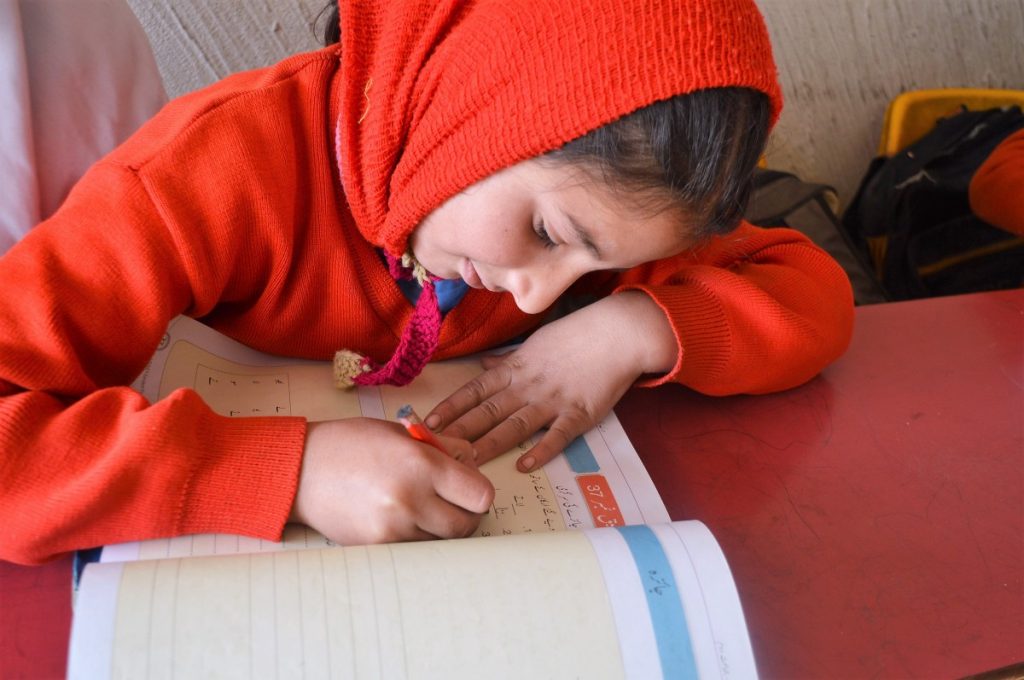
Taighoon Nissa used to teach her students how to read in Urdu, Pakistan’s national language, through a cramming approach.
But the primary school teacher in the city of Skardu has since discovered a more practical method to teach reading. She now uses techniques like clapping the syllables of a word, games that involve segmenting words into letters, and more. These techniques improve reading fluency and ultimately reading comprehension.
It has made a difference; Nissa’s students are now more confident and stronger communicators. She credits that transformation to the trainings she received through the Pakistan Reading Project.
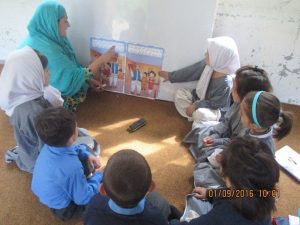 “I knew what to teach but after face-to-face trainings and Teacher Inquiry Group meetings with PRP, I am trained on how to teach,” she says.
“I knew what to teach but after face-to-face trainings and Teacher Inquiry Group meetings with PRP, I am trained on how to teach,” she says.
Funded by the U.S. Agency for International Development (USAID), PRP aims to improve the reading skills of 1.3 million children in grades 1 and 2 across the country by developing the skills of reading teachers and establishing a culture of reading. World Learning, in partnership with a consortium of international and local partners led by the International Rescue Committee, implements the program in Pakistan’s Gilgit-Baltistan and Azad Jammu Kashmir territories.
World Learning has trained nearly 4,859 teachers at 3,160 public schools since PRP launched in 2013. Based in experiential learning and inclusion, two hallmarks of the World Learning approach, these trainings encourage teachers to shift from lecture-based learning to hands-on activities, role play, and other exercises that immerse students in their education. Beyond giving students more confidence in their reading, the training has led to progressively — and significantly — better exam results.
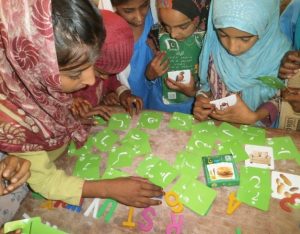 Girls Middle School Pakora in Gilgit-Baltistan, for example, faced serious challenges in teaching students how to read in Urdu. In the 2013–14 school year, only four of 15 students in grade 1 passed their annual exams. Likewise, in grade 2, only five of 19 students passed.
Girls Middle School Pakora in Gilgit-Baltistan, for example, faced serious challenges in teaching students how to read in Urdu. In the 2013–14 school year, only four of 15 students in grade 1 passed their annual exams. Likewise, in grade 2, only five of 19 students passed.
After taking part in PRP trainings, teachers like Bibi Harira and Bibi Mubashira started to work together to engage their students using the new methods.
Now students’ scores are higher than ever. In 2016, 15 out of 16 students passed the annual grade 1 reading exam, while 17 out of 22 students passed in grade 2. The following year, 17 students passed the grade 1 exam and 16 of 17 passed the grade 2 exam. Ten students achieved A and A+ results.
Teachers, too, have unlocked new career opportunities after participating in PRP trainings. Harira and Mubashira — having achieved the best results in Urdu in their school — have now been assigned to teach Urdu to students in grades 1 to 6.
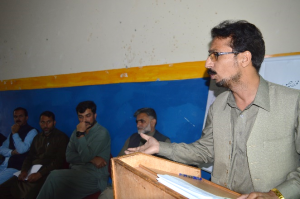 “It is very important that our teachers are professional and skillful,” says Qazi Abdul Jalil Jalili, the District Education Officer-Male in the Hattian district of Azad Jammu Kashmir.
“It is very important that our teachers are professional and skillful,” says Qazi Abdul Jalil Jalili, the District Education Officer-Male in the Hattian district of Azad Jammu Kashmir.
Jalili is taking steps to make sure that all teachers in his district gain the skills that have boosted the careers of Harira and Mubashira.
Until recently, Jalili was the headmaster of the Government Boys High School Sharian and participated in PRP as a mentor. He was very active in the program, particularly the Teacher Inquiry Group meetings that brought teachers together to share their experiences in the field, learn from each other, and gain the confidence to implement PRP activities in their classrooms.
Jalili was so impressed by the experience that, upon being named to his new position in January 2018, he asked the PRP team to provide technical support for including Urdu reading assessments in his district’s annual exams. He also requested the team’s help in replicating the PRP model in schools that were not included in the program.
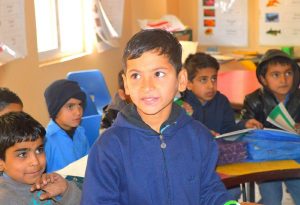 “We need to extend these skills and techniques across the district,” he says. “I feel responsible to make all possible efforts to improve the reading skills of children in the schools of my district.”
“We need to extend these skills and techniques across the district,” he says. “I feel responsible to make all possible efforts to improve the reading skills of children in the schools of my district.”
So far, an additional 64 teachers have taken part in two-day in-person trainings at four locations. These sessions were led by PRP-trained mentors, while project staff members were also available to provide technical support.
Jalili says this kind of cooperation between the district’s education department and the Pakistan Reading Project benefits the local government agency. Not only will it have a long-term impact on the quality of teaching and learning in his schools, but he says it will also increase public trust in the education department.
“We can only win the trust of parents by providing quality education in our schools,” he says. “This training is a good step in this direction.”
Succeeding as a Woman in Technology in Pakistan
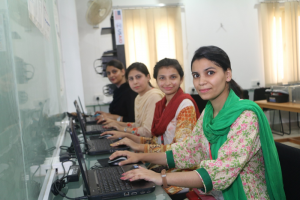
Women across the globe often hesitate to study and pursue careers in technology. Durr-e-Nayab, a programming teacher at the University of Engineering & Technology in Peshawar, Pakistan, is an exception.
She has always been curious. Her earliest memories are of tearing apart her toys. She imagined herself as an engineer who built programs and designed things.
“I really looked up to my brother, who was an engineer,” she says. “Luckily, my parents encouraged me to follow my interests.”
Nayab opted for a computer science postgraduate degree and began teaching at the Computer Systems Engineering department at UET Peshawar. She is also pursuing a PhD.
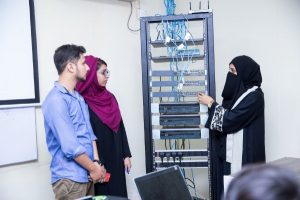 Seeing her passion, the university management nominated her for a training offered by the U.S. Agency for International Development (USAID) called the Skills for Youth Program (SYP). Through SYP, youth in the critical stabilization regions of Khyber Pakhtunkhwa and the Federally Administered Tribal Areas learned Information and communications technology skills and were linked to employment opportunities.
Seeing her passion, the university management nominated her for a training offered by the U.S. Agency for International Development (USAID) called the Skills for Youth Program (SYP). Through SYP, youth in the critical stabilization regions of Khyber Pakhtunkhwa and the Federally Administered Tribal Areas learned Information and communications technology skills and were linked to employment opportunities.
Nayab enrolled in Cisco Certified Network Associate (CCNA) Routing & Switching and CCNA Security training. Thanks to the hands-on experience with networking, she is now able to explain concepts to her students in a more engaging way. “SYP was different because we were taught as future instructors,” she says.
Aside from becoming a better teacher, Nayab also has the option to work in the field. “There is a difference between theoretical knowledge and practicality, and this training has helped me bridge that gap,” she says.
Soft skills were also a focus of the SYP program. Nayab said the sessions on public speaking were particularly helpful, and today, with both subject knowledge and confidence, she often takes the lead in faculty meetings and is seen as a candidate for a senior leadership position.
Nayab is the first woman in her family to pursue a technical education. She is an inspiration for her younger cousins and nieces. It’s clear that Nayab is not only breaking stereotypes, she’s bringing change to society around her.
Written by Zara Basharat, Country Director of Communications and Public Relations, World Learning Pakistan
Raising a Generation of Readers with the Pakistan Reading Project
USAID-Funded Program Aims to Increase Girls Access to Education in Pakistan
World Learning and Benazir Income Support Programme Partner to Expand Girls’ Access to Education in Pakistan
Pakistan
Expanding Horizons through Academic Exchange
The Legislative Fellowship Experience
Training for Pakistan Participant to Return Home with a PhD from the University of Arkansas
World Learning Receives MoneyGram Foundation Grant to Add 15,000 Books to Pakistani School Libraries
World Learning’s USAID-funded Pakistan Reading Project (PRP) has received $50,000 from The MoneyGram Foundation to provide 15,000 books to 100 government schools as part of the project’s efforts to build the reading skills of more than 1.3 million children across the country.
The MoneyGram Foundation grant will contribute to this work by providing 150-book libraries to 100 government schools in the Bhimber, Muzaffarabad, Mirpur, Hattian Bala, Kotli and Neelum districts of Pakistan’s Azad Jammu and Kashmir (AJK) region. The libraries will include new reading materials designed by World Learning and books from local authors and publishers on subjects that aim to inspire students’ academic and personal growth.
“World Learning is grateful for The MoneyGram Foundation’s generous financial support for this vital program. Such private sector partnerships with development organizations are important to promote and sustain education and reading efforts worldwide.” said Sakil Malik, World Learning’s vice president for Global Development. “Literacy is the foundation for learning and this funding will deliver essential educational resources to help thousands of students develop the reading skills they need to succeed in the classroom.”
PRP is improving literacy education in Pakistan by providing training and professional development for nearly 25,000 teachers and educators in 14,000 public schools and engaging local communities to help establish a culture of reading. Funded by the United States Agency for International Development (USAID), World Learning is implementing the project in partnership with a consortium of international and local partners led by the International Rescue Committee (IRC).
MoneyGram established the MoneyGram Foundation in 2012 to help children around the world gain access to educational facilities and learning resources. Its mission is firmly rooted in the belief that education is at the heart of better economic opportunities, healthier families and individual freedom and empowerment. The MoneyGram Foundation is focused on inspiring minds and improving lives and grants funds to deserving organizations with this mission in mind. To learn more, please visit moneygramfoundation.org or connect with us on Facebook.
World Learning is a nonprofit organization empowering people and strengthening institutions through education, sustainable development, and exchange programs in more than 100 countries.
Raising the Curtain on Theatre in Pakistan
Linda Alper is an actress, playwright, director, and all around theatre veteran from Portland, Oregon, who loves sharing her stagecraft with people outside the U.S.
Last October, Alper traveled to Pakistan as a Fulbright Specialist to work with a non-professional theatre group. She directed and taught writing and acting workshops in Islamabad and Lahore on a 20-day program that she says was just as enriching for her as it was for her students.
“Theatre is an ideal medium for cultural exchange,” observes Alper.
Alper was invited by Theatre Wallay, an 11-year old, non-professional theatre group based in Islamabad that produces work for the stage and strives to appeal to audiences across social, ethnic, and religious divides, and provides entertainment and growth opportunities to children and young people.
It was Alper’s second Fulbright award to teach drama overseas. In 2011–2012 she was a Fulbright Scholar to Taiwan, where she taught Shakespeare to English majors at Soochow University. Her students, many of whom had no prior acting experience, performed “A Midsummer Night’s Dream,” creating the production from the ground up under her guidance.
Reflecting on her more recent Fulbright experience in Pakistan, Alper says, “It was a privilege to do this work in a Muslim country.” As a writer, she says “working with people who come from a different literary tradition is very stimulating.”
Her workshop participants varied in age and background. And although none of them were theatre professionals, Alper says she found them “generous with their stories and natural writers.”
Alper enjoyed an illustrious 23-year career as an actress with the renowned Oregon Shakespeare Festival, a not-for-profit professional theatre founded in 1935 located in Ashland, Oregon, about 15 miles north of the California border.
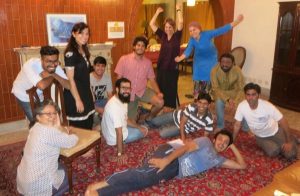 At the end of November, she returned to Pakistan on a grant from the Public Affairs Section of the U.S. Embassy in Islamabad, Pakistan, to collaborate with fellow Fulbright Specialists David Studwell and Kathleen Mulligan, two theatre professionals with whom she worked at Theatre Wallay last year.
At the end of November, she returned to Pakistan on a grant from the Public Affairs Section of the U.S. Embassy in Islamabad, Pakistan, to collaborate with fellow Fulbright Specialists David Studwell and Kathleen Mulligan, two theatre professionals with whom she worked at Theatre Wallay last year.
This time around, the three Americans and the Islamabad-based theatre company will bring to stage an original theatre piece called On Common Ground, a celebration and reclamation of public spaces — schools, squares, mosques and parks — as places for learning, leisure, and worship that have been targets of terror attacks.
“Artists aren’t supported here,” says Alper, explaining the importance of their work. “It’s not part of the culture. So there aren’t a lot of role models.”
The three Americans will work with eight Theatre Wallay actors and writers, two Pakistani musicians, a dancer and a stage manager to develop the performance. On Common Ground is scheduled to travel to the U.S. during the summer of 2017, where it will be performed the last week of June in Portland, Oregon at the Artists Repertory Theatre, where Alper is a resident artist, and the first week of July at the Oregon Shakespeare Festival.
Reflecting on her Fulbright experience, the American actress says, “It taught me what the world looks like from another point of view. There are a lot of different ways that people live that are good.”
Alper adds, “I wish everyone could do this.”
The Fulbright Specialist Program was established in 2001 by the U.S. Department of State and the Bureau of Educational and Cultural Affairs (ECA) to enable U.S. professionals and scholars to work on short-term projects overseas in conjunction with local host institutions.
For more information about the Fulbright Specialist Program or to apply, please go to: https://fulbrightspecialist.worldlearning.org/the-fulbright-specialist-program/
Advancing Girls’ Education and Skills
Program Achievements
- Integration of a new accelerated learning scheme of studies into the Khyber Pakhtunkhwa curriculum
- Development of life skills narratives which included interactive, decision-based games to build life skills through examination, intention, and action.
- Developed partnerships with highly committed employers, customized training approaches based on employer needs, and supported 200 young women to complete vocational training and obtain long-term employment above minimum wage
Reports
Alumni Thematic International Exchange Seminars
Participant Profile
Participants are alumni of U.S. government-sponsored exchange programs and vary in age and level of expertise, but all will be engaged in the seminar topic and highly motivated to create change in their communities.
Please consult the list of U.S. government-sponsored exchange programs below.
- U.S. citizen: https://exchanges.state.gov/us
- Non-U.S. citizen: https://exchanges.state.gov/non-us
Participant Selection
Alumni TIES participants who are not U.S. citizens are nominated by the U.S. Embassies or Consulates in their countries. Please contact the U.S. Embassy or Consulate in your country to learn how you can participate in Alumni TIES. Potential Alumni TIES participants who are living in the United States can apply for specific seminars managed by World Learning. The web link to the online application will be distributed widely by the Office of Alumni Affairs of the Bureau of Educational and Cultural Affairs.
All participants for Alumni TIES seminars are selected by the U.S. Department of State.
Program Design
Alumni TIES seminars take place in six world regions and the U.S.; each seminar is three to four days for small groups of alumni. The seminars include speakers, capacity development trainings, and alumni networking activities. Through the small grants initiative, alumni have the opportunity to take action and make a positive difference in their communities.
Learn More
Watch more videos about the Alumni TIES program.
Read stories from past participants about their experiences at the seminars or with their small grant projects on the Alumni TIES blog.
For information on programs for U.S. government-sponsored exchange program alumni visit the International Exchange Alumni website.
Alumni TIES is sponsored by the U.S. Department of State with funding provided by the U.S. Government and supported in its implementation by World Learning, in partnership with the Office of Alumni Affairs of the Bureau of Educational and Cultural Affairs (ECA).
Digital Communication Network
Examples of Past Digital Communication Network Projects
- Internet vs. Democracy Forum
- Roaring 20s #Digital Forum
- Combatting Disinformation Training Program
- Digital and Media Literacy for NGOs Training Program
- Tolerance and Coexistence 2.0 Forum
- Montenegro Digital Influencers Hub
- Humor and Games for Social Good Forum
Fulbright Specialist Program
What?
Link U.S. Experts and International Institutions
A program of the U.S. Department of State, Bureau of Educational and Cultural Affairs, the Fulbright Specialist Program is a unique opportunity for U.S. academics and established professionals to engage in two- to six-week consultancies at host institutions across the globe. Host institutions, including universities, non-profits, and other organizations, develop and submit projects for approval by the U.S. Embassy or Fulbright Commission in their country in wide-ranging academic and professional fields that build capacity and promote long-lasting linkages between individuals and institutions in the U.S. and abroad.
Why?
Address Priorities and Build Institutional Capacity at Institutions Around the World
An important companion to the traditional Fulbright Scholar Program, the Fulbright Specialist Program differs by providing short-term exchange experiences that tackle discrete, sometimes rapid response, projects. The Fulbright Specialist Program encourages participation of both university faculty and highly experienced non-academics, including legal experts, business professionals, public health practitioners, scientists, IT professionals, artists, and journalists. The program is a mutually beneficial opportunity for the Specialist who may not be available to leave their position for an extended period of time and the host institution which needs an experienced partner to jointly tackle a problem or examine an issue on a short-term basis.
How?
Become a Fulbright Specialist: Apply to Join the Roster
Fulbright Specialists are a diverse group of highly experienced, well-established faculty members and professionals who represent a wide variety of academic disciplines and professions. In order to be eligible to serve as a Fulbright Specialist, candidates must have significant experience in their respective professional field and be a U.S. citizen at time of application. Eligible disciplines and professional fields supported by the Fulbright Specialist Program are listed below.
- Agriculture
- American Studies
- Anthropology
- Archeology
- Biology Education
- Business Administration
- Chemistry Education
- Communications and Journalism
- Computer Science and Information Technology
- Economics
- Education
- Engineering Education
- Environmental Science
- Law
- Library Science
- Math Education
- Peace and Conflict Resolution Studies
- Physics Education
- Political Science
- Public Administration
- Public/Global Health
- Social Work
- Sociology
- Urban Planning
Interested candidates can find more information about the Fulbright Specialist Program and apply to serve as a Specialist at fulbrightspecialist.worldlearning.org. Candidates who meet all eligibility requirements will have their full applications reviewed by a panel of their professional peers. Candidates who are approved by the peer review panels will then join the Fulbright Specialist Roster. Individuals remain on the Specialist Roster for a three-year term and are eligible to be matched with a host institution’s project abroad during that tenure.
The following costs are covered for those Fulbright Specialists who are matched to a project: international and domestic airfare, ground transportation, visa fees, lodging, meals, and incidentals. A daily honorarium is also provided.
Become a Host: Bring a Fulbright Specialist to Your Institution
The Fulbright Specialist Program allows universities, cultural centers, non-governmental organizations, and other institutions abroad to host a leading U.S. academic or professional to work on diverse, short-term collaborative projects where the Specialist conducts activities which may include, but are not limited to:
- Delivering a seminar or workshop
- Consulting on faculty or workforce development
- Developing academic or training curricula and materials
- Lecturing at the graduate or undergraduate level
- Conducting needs assessments or evaluations for a program or institution
Institutions interested in hosting a Fulbright Specialist should contact their local Fulbright Commission or U.S. Embassy for country-specific requirements and deadlines.
Contact information for all participating countries is available on the fulbrightspecialist.worldlearning.org website.
For more information or questions about the Fulbright Specialist Program, please email [email protected].
The Fulbright Specialist Program is a program of the U.S. Department of State with funding provided by the U.S. government and administered by World Learning.
Sharing Development Stories with the Pakistani People
Building a Culture of Literacy in Pakistan
International Visitor Leadership Program
End of Year Report
Chosen by U.S. embassies worldwide to participate, distinguished professionals include:
- parliamentarians
- government officials
- entrepreneurs
- NGO leaders
- journalists
- academics
- arts administrators
- mid-career professionals
Programs focus on policy issues in areas such as:
- government
- international security
- foreign policy
- entrepreneurship
- economics and trade
- media
- women’s leadership
- education
- public health
- arts
- agriculture
- disability rights and inclusion
World Learning staff members design national itineraries, arrange logistics, set up meetings in Washington, DC, and coordinate the collaboration of U.S. Department of State program officers, interpreters and International Visitor Liaisons, and more than 85 community-based member organizations from the Global Ties U.S. Network who arrange local programs nationwide.
Participants
Most participants are mid-career professionals and emerging leaders, and for many, this is their first visit to the U.S. Groups are of varying sizes, from single visitors to groups of 25 or more. World Learning program staff work closely with their State Department counterparts to design a program customized to the project objectives and the visitors’ interests.
Participant Selection
IVLP candidates are selected solely by U.S. embassy personnel in each country. There is no application form. World Learning is a private sector partner of the U.S. Department of State; our role is limited to designing programs for participants once they arrive in the U.S. For further information regarding the program, please consult the U.S. Department of State’s website.
Program Design
A typical project includes up to a week of meetings in Washington, DC, to provide an orientation and overview of the theme and to introduce visitors to federal officials and agencies, national organizations, academics and think tanks, nonprofits and NGOs, and professionals in their specific field of interest. All projects include a briefing on the US federal system of government. Meetings may include panel discussions, site visits, workshops, individual interlocutors, job shadowing, or service opportunities. Visitors typically travel to an additional three or four cities in geographically diverse regions of the country; the itinerary may include a state capital and a small town to provide first-hand exposure to the great diversity that exists in the U.S. Also included in the program design are hospitality dinners, school visits, community service activities, and cultural events such as rodeos, state fairs, festivals, visits to national parks, or events that highlight some unique aspect of the region visited.
Participant Experience
“My recent experience in the IVLP program is so far the deepest ever for me to see and understand the full picture of what America as a country is like. I strongly believe this program will have a very long-term impact on my views about America and the world and to some extent it has already helped me to understand many long-time questions.” – Journalist from China




